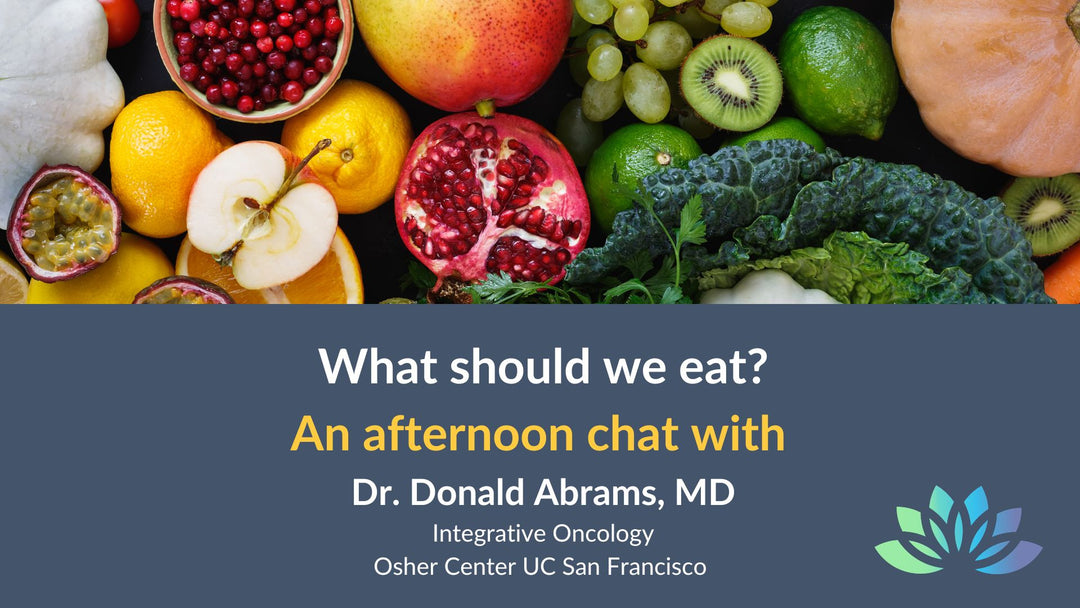Integrative Oncologist
Donald Abrams, MD
Dr. Donald Abrams is a pioneer in integrative oncology, internationally recognized for his clinical research investigating the therapeutic value of complementary therapies for cancer. He was named a “Top Cancer Doctor” in Newsweek’s Special Health Issue on Curing Cancer, in the category of Medical Oncology.
Dr. Abrams views cancer as undesirable weed in the body and his approach is to enrich you with integrative therapies that make your body inhospitable for the cancer "weed" to grow.
Dr. Abrams Blogs & Videos
What should we eat?
Dr. Abrams shares his recommendations on the foods that are beneficial and those that would be best minimized or avoided to decrease the risk of disease, including cancer.
Supplements Dr. Abrams takes
Learn about the dietary supplement regimen of Dr. Abrams, what he takes, why and how frequently.
Medicinal mushrooms & cancer
See this informative 13-minute video to learn about medicinal mushroom types, benefits, and risks for people with cancer.
Cannabis & cancer
Dr. Abrams clarifies the differences between cannabis, marijuana, THC, CBD, and simplifies the medical research about their health benefits and risks.
Stress & cancer
Learn about the benefits and risks of stress reduction therapies as well as the impact of stress on people with cancer.
Vitamin D & cancer
Learn about vitamin in D benefits and risks in people with Cancer. In this short video, Dr. Abrams discusses the role of vitamin D for people with cancer.
Omegas & fish oil explained
Learn about omega 3 and omega 6 fatty acids, their benefits, and risks including role of Omegas for people with cancer.
Bone & joint heath supplements
Learn about the benefits and risks of supplements for bone and joint health as well as the impact of cancer on bone and joint health.
Key nutrients discussed in above blogs
Letter Vitamins & Minerals
- Vitamin D: Research has shown that Vitamin D may slightly reduce the risk of metastatic cancer and cancer-related mortality.
- Vitamin B12: When dealing with challenges of cancer related mental wellness, research shows that when Vitamin B12 is taken early enough, it may delay the beginning of depression when taken with other medications.
- Calcium: Oral calcium seems to be beneficial for preventing colorectal cancer, especially in those with adequate vitamin D levels and normal body mass index (BMI).
- Magnesium: Increasing dietary magnesium intake seems to lower the risk of colon cancer. Relaxing forms of Magnesium such as Magnesium Glycinate may also support sleep.
Antioxidants
- Melatonin is well known for researched benefits to help you sleep in lower doses from 3-10 mg. However, evidence also shows that higher doses of melatonin up to 20 mg with other treatments led to some tumor regression and improved survival rates.
- Fish Oil: Higher intake of fish has been associated with a decrease in the risk of depression and suicide in people. Fish oil may also reduce inflammation in joints and help with pain in patients that are overweight.
- Glucosamine: When taken with chondroitin for at least 4 weeks, Glucosamine is modestly helpful in reducing pain and improving function in knee osteoarthritis.
- Chondroitin: A naturally occurring substance in the connective tissues that seems to modestly reduce pain and improve function for osteoarthritis.
Mushrooms
- Turkey Tail Mushroom (Coriolus / Trametes): The most active part of coriolus mushroom for its immune effects is PSK. Some of the studies done on this compound show positive effects on immune system cells that help fight cancer.
- Mushroom Blend Including Reishi Mushroom: 9 clinical trials using different types of reishi mushroom products along with chemotherapy found that responses increased by 30% when combined with chemotherapy instead of just with chemotherapy.
Botanicals
- Turmeric: One clinical study that showed taking curcumin orally three times a day for a week, beginning 4 days prior to docetaxel and prednisone treatment then continuing for up to 6 cycles, deceases the PSA levels up to half in 59% of patients when compared to a baseline. Another research showed that 1 gram daily improves symptoms of depression after 6 weeks when taken along with an antidepressant.
- Pomegranate Extract: Early research that shows pomegranate may decrease the cancer progression in some patients after their surgery or radiation for prostate cancer.
- Green Tea: A small analysis from three clinical trials shows that taking green tea for 12-30 months may reduce the risk of prostate cancer by roughly 62% when compared with placebo in with higher risk patients.
- Ashwagandha: Oral ashwagandha appears to help in the reduction of stress. It may also reduce weight gain attributed to stress.
- Valerian Root: Taking valerian whole root extract 300–600 mg daily modestly improves subjective sleep quality, although it might take up to four weeks for the benefit to set in.












